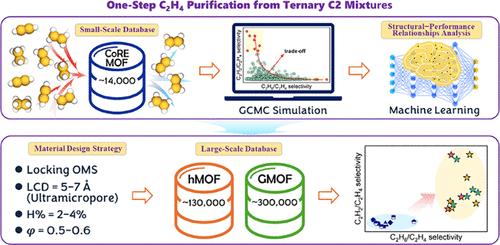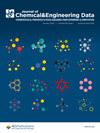Machine Learning Assisted Discovery of Efficient MOFs for One-Step C2H4 Purification from Ternary C2H2/C2H4/C2H6 Mixtures
IF 2
3区 工程技术
Q3 CHEMISTRY, MULTIDISCIPLINARY
引用次数: 0
Abstract
Purifying C2H4 from a mixture of C2H2/C2H4/C2H6 using a single adsorbent is crucial industrially. Yet, the challenge lies in their similar physicochemical properties, leading to low separation efficiency. Additionally, the lack of understanding regarding the structure–performance relationships hinders the development of high-performance metal–organic frameworks (MOFs). In this study, machine learning assisted high-throughput molecular simulation methods are employed to discover efficient MOFs for one-step C2H4 purification. The general material design strategies were proposed based on the analysis of 14,142 CoRE MOF simulation data. These include locking open metal sites, ensuring relative mass proportion of H atoms in the range of 2–4%, optimizing the largest cavity diameter to span 5–7 Å (ultramicropore), and fine-tuning φ within 0.5–0.6. Further using the computational insights obtained, 10 materials were identified with both C2H2/C2H4 and C2H6/C2H4 selectivities exceeding 3 from 137,953 hypothetical MOFs and 303,991 generated MOFs through additional molecular simulations. Our study not only provides screened and designed potential candidates for efficient one-step C2H4 purification from ternary C2H2/C2H4/C2H6 mixtures but also provides useful information for further performance improvement.

机器学习辅助发现从 C2H2/C2H4/C2H6 三元混合物中一步提纯 C2H4 的高效 MOFs
使用单一吸附剂从 C2H2/C2H4/C2H6 混合物中提纯 C2H4 在工业上至关重要。然而,挑战在于它们相似的物理化学特性导致分离效率低下。此外,对结构-性能关系缺乏了解也阻碍了高性能金属有机框架(MOFs)的开发。本研究采用机器学习辅助高通量分子模拟方法来发现用于一步法纯化 C2H4 的高效 MOFs。根据对 14,142 个 CoRE MOF 模拟数据的分析,提出了一般材料设计策略。这些策略包括锁定开放的金属位点,确保 H 原子的相对质量比例在 2-4% 之间,优化最大空腔直径至 5-7 Å(超微孔),以及将 φ 微调至 0.5-0.6 范围内。利用所获得的计算见解,我们从 137,953 种假设的 MOFs 和 303,991 种通过额外的分子模拟生成的 MOFs 中,进一步确定了 10 种 C2H2/C2H4 和 C2H6/C2H4 选择性均超过 3 的材料。我们的研究不仅为从 C2H2/C2H4/C2H6 三元混合物中一步法高效纯化 C2H4 提供了经过筛选和设计的潜在候选材料,而且还为进一步提高性能提供了有用的信息。
本文章由计算机程序翻译,如有差异,请以英文原文为准。
求助全文
约1分钟内获得全文
求助全文
来源期刊

Journal of Chemical & Engineering Data
工程技术-工程:化工
CiteScore
5.20
自引率
19.20%
发文量
324
审稿时长
2.2 months
期刊介绍:
The Journal of Chemical & Engineering Data is a monthly journal devoted to the publication of data obtained from both experiment and computation, which are viewed as complementary. It is the only American Chemical Society journal primarily concerned with articles containing data on the phase behavior and the physical, thermodynamic, and transport properties of well-defined materials, including complex mixtures of known compositions. While environmental and biological samples are of interest, their compositions must be known and reproducible. As a result, adsorption on natural product materials does not generally fit within the scope of Journal of Chemical & Engineering Data.
 求助内容:
求助内容: 应助结果提醒方式:
应助结果提醒方式:


